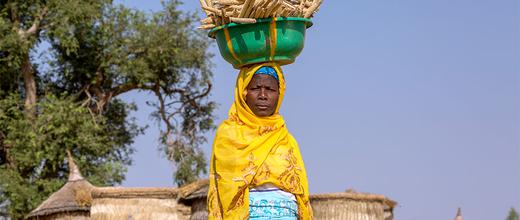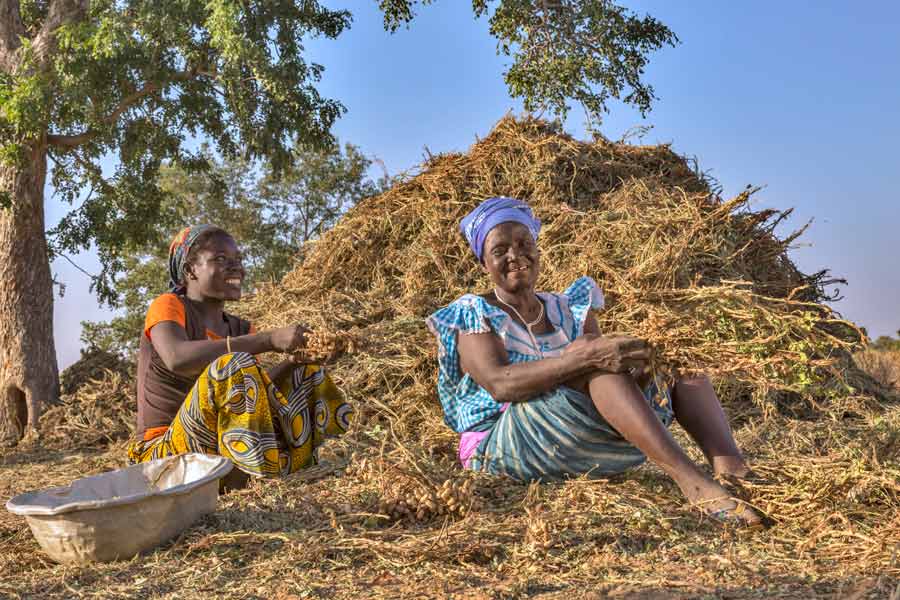The views expressed in our content reflect individual perspectives and do not represent the authoritative views of the Baha'i Faith.
Historically, we’ve ignored and marginalized smallholder farmers and their knowledge of sustainable agriculture. What if we could find a way to right this historic wrong and pull back the invisibility cloak?
What if, in doing so, they could be enlisted as a global force to help in addressing some of the greatest challenges we face as a human family: achieving food security, combating climate change and reaching gender equality? What if we could deal with those three serious issues all at once?
I would like to suggest we can do all that by orienting our attention to female farmers.
Most of what happened to keep smallholder farmers down for so long came as a result of external forces beyond their control. But one thing, a part of the culture of every country in the world to varying degrees, has predominated: the failure to accept and implement gender equality. It took no outside influence for smallholder farmers to reflect the larger cultures around them and systematically withhold from women farmers virtually every kind of support that male farmers take for granted as part of the status quo.
For this reason, I am framing today’s essay in the context of women farmers. Currently, we have a unique opportunity to rebuild the worldwide smallholder farming community as a global force for good.
But here is the key to the whole concept: no initiative, no community, no civilization, no global undertaking will ever reach its full potential unless and until women achieve full, unfettered and unquestioned equality with men. Why would anyone even think about a plan to improve the human condition and handicap it from the start by not building in the emancipation of women at its core? The Baha’i teachings have posed that vital question to humanity for almost two centuries now:
… let it be known once more that until woman and man recognize and realize equality, social and political progress here or anywhere will not be possible. For the world of humanity consists of two parts or members: one is woman; the other is man. Until these two members are equal in strength, the oneness of humanity cannot be established, and the happiness and felicity of mankind will not be a reality. – Abdu’l-Baha, The Promulgation of Universal Peace, p. 77.
Smallholder farmers in Burkina Faso (photo by Andrew
Esiebo, The Gaia Foundation)
I’m talking about women like these farmers from Burkina Faso. Seven years ago their village suffered from a severe lack of food and income. The women banded together and took over agriculture in the area. They became the main income earners for their families and used ecologically sound techniques to build soil fertility, preserve water and navigate the droughts brought on by climate change. They used agriculture to change their community’s destiny.
So today I’m happy to impart some good news—the smallholder revolution has begun. It’s still below the radar, but it has started to take shape over the last several years, one project at a time, one region at a time, one committed group of women at a time.
The revolution doesn’t have a name yet. No logo. It does have some heroes to be sure, like Vandana Shiva and others who attended the Parliament of Religions with me last year. But the thousands of projects and experiments and ideologies supporting smallholder farmers throughout the developing world have yet to meet and form any kind of a coherent movement. It is coming, it’s building, but it’s not quite here yet.
This is probably a good thing, because there’s some serious work to be done in order to make sure this revolution comes with a clear plan of action. This is where you come in, people from so many different faith communities and areas of the world, people whose involvement in development activities is shaped by your Faith, as mine is by the Baha’i teachings.
Just to clarify, I am not speaking on behalf of the Baha’i Faith or its institutions. This is just me trying to serve like I mean it. I quote from Baha’u’llah, the founder of the Baha’i Faith, when he wrote “The earth is but one country, and mankind its citizens.” – Tablets of Baha’u’llah, p. 167.
This essay is adapted from a talk by Hugh Locke to the Parliament of the World’s Religions that took place in Toronto in November, 2018.
Cover photo by Andrew Esiebo, The Gaia Foundation


















Comments
Sign in or create an account
Continue with Facebookor